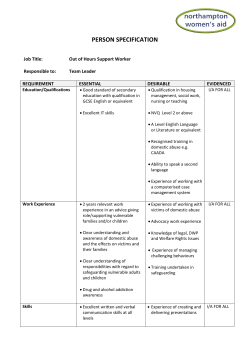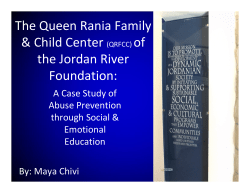
Vulnerable Adult Protection Policy
Aston Clinton Baptist Church “W e are called to ser ve God and to share his love with others” Safeguarding Vulnerable Adults Policy Introduction This statement was agreed at the Church Business Meeting held on Tuesday, 24th April 2012. We are called to serve God and to share his love with others”. Aston Clinton Baptist Church (ACBC) is committed to safeguarding and promoting the welfare of vulnerable adults, engaged in the breadth of its activities. All adults have the right to be safe from harm and should be able to live free from fear of abuse, neglect and exploitation The purpose of this policy is to outline the duty and responsibility of all persons working on behalf of ACBC in relation to the protection of vulnerable adults from abuse. A separate child protection policy exists and together with this policy this completes our overall Safeguarding Policy for the Church. It will be read annually at the Annual Church Meeting held in the month of January/February where progress in carrying it out will be monitored. The policy may be changed by a majority vote at a Church Business Meeting that has been duly convened according to the Constitution of Aston Clinton Baptist Church. Context For the purpose of this document ‘adult’ means a person aged 18 years or over. Some adults are less able to protect themselves than others, and some have difficulty making their wishes and feelings known. This may make them vulnerable to abuse. The broad definition of a ‘vulnerable adult’ referred to in the 1997 Consultation Paper ‘who decides?’ issued by the Lord Chancellor’s Department, is a person: “Who is or may be in need of community care services by reason of mental or other disability, age or illness; and who is or may be unable to take care of him or herself, or unable to protect him or herself against significant harm or exploitation”. The first priority should always be to ensure the safety and protection of vulnerable adults. To this end it is the responsibility of all staff to act on any suspicion or evidence of abuse or neglect (see the Public Interest Disclosure Act 1998) and to pass on their concerns to a responsible person/agency. For purposes of ensuring consistent and widely understood terminology, this policy and procedures will use the phrase ‘Vulnerable Adults’ to identify those eligible for interventions within the procedures. Legal framework This guidance reflects the principles contained within the Human Rights Act 1998, the Mental Capacity Act 2005 and Public Interest Disclosure Act 1998. The Mental Capacity Act 2005, covering England and Wales, provides a statutory framework for people who lack capacity to make decisions for themselves, or who have capacity and want to make preparations for a time when they may lack capacity in the future. It sets out who can take decisions, in which situations, and how they should go about this. The Human Rights Act 1998 gives legal effect in the UK to the fundamental rights and freedoms contained in the European Convention on Human Rights (ECHR). The Public Interest Disclosure Act 1998 (PIDA) created a framework for whistle blowing across the private, public and voluntary sectors. The Act provides almost every individual in the workplace with protection from victimisation where they raise genuine concerns about malpractice in accordance with the Act’s provisions. The role of staff, volunteers and trustees All persons working on behalf of ACBC have a duty to promote the welfare and safety of vulnerable adults. Persons may receive disclosures of abuse and observe vulnerable adults who are at risk. This policy will enable staff/volunteers to make informed and confident responses to specific adult protection issues. What is abuse? Abuse is a violation of an individual’s human and civil rights by any other person or persons. Abuse may consist of a single act or repeated acts. It may be physical, verbal or psychological, it may be an act of neglect or an omission to act, or it may occur when a vulnerable person is persuaded to enter into a financial or sexual transaction to which he or she has not consented, or cannot consent. Abuse can occur in any relationship and it may result in significant harm to, or exploitation of, the person subjected to it. The Department of Health in its ‘No Secrets’ report suggests the following as the main types of abuse: Physical abuse- including hitting, slapping, pushing, kicking, misuse of medication, restraint, or inappropriate sanctions. Sexual abuse- including rape and sexual assault or sexual acts to which the vulnerable adult has not consented, or could not consent or was pressured into consenting. Psychological abuse- including emotional abuse, threats of harm or abandonment, deprivation of contact, humiliation, blaming, controlling, intimidation, coercion, harassment, verbal abuse, isolation or withdrawal from services or supportive networks. Financial or material abuse- including theft, fraud, exploitation, pressure in connection with wills, property or inheritance or financial transactions, or the misuse or misappropriation of property, possessions or benefits. Neglect and acts of omission- including ignoring medical or physical care needs, failure to provide access to appropriate health, social care or educational services, the withholding of the necessities of life, such as medication, adequate nutrition and heating. Discriminatory abuse- including racist, sexist, that based on a person’s disability, age or sexuality and other forms of harassment, slurs or similar treatment. Procedure in the event of a disclosure It is important that vulnerable adults are protected from abuse. All complaints, allegations or suspicions must be taken seriously. This procedure must be followed whenever an allegation of abuse is made or when there is a suspicion that a vulnerable adult has been abused. Promises of confidentiality should not be given as this may conflict with the need to ensure the safety and welfare of the individual. A full record shall be made as soon as possible of the nature of the allegation and any other relevant information. Copies of this information will be kept in a secure location. This should include information in relation to the date, the time, the place where the alleged abuse happened, your name and the names of others present, the name of the complainant and, where different, the name of the adult who has allegedly been abused, the nature of the alleged abuse, a description of any injuries observed, the account which has been given of the allegation. Responding to an allegation Any suspicion, allegation or incident of abuse must be reported to the Designated Vulnerable Adult Protection Officer, Minister, Secretary or Deacon. The nominated member of staff shall telephone and report the matter to the appropriate local adult social services duty social worker. A written record of the date and time of the report shall be made and the report must include the name and position of the person to whom the matter is reported. The telephone report must be confirmed in writing to the relevant local authority adult social services department within 24 hours. Responding appropriately to an allegation of abuse In the event of an incident or disclosure: DO Make sure the individual is safe. Assess whether emergency services are required and if needed call them. Listen. Offer support and reassurance. Ascertain and establish the basic facts. Make careful notes and obtain agreement on them. Ensure notation of dates, time and persons present are correct and agreed. Take all necessary precautions to preserve forensic evidence. Follow correct procedure Explain areas of confidentiality; immediately speak to your manager for support and guidance. Explain the procedure to the individual making the allegation. Remember the need for ongoing support. DON’T Confront the alleged abuser. Be judgmental or voice your own opinion. Be dismissive of the concern. Investigate or interview beyond that which is necessary to establish the basic facts. Disturb or destroy possible forensic evidence. Consult with persons not directly involved with the situation. Ask leading questions. Assume Information. Make promises. Ignore the allegation. Elaborate in your notes. Panic It is important to remember that the person who first encounters a case of alleged abuse is not responsible for deciding whether abuse has occurred. This is a task for the professional adult protection agencies, following a referral from the designated Vulnerable Adult Protection Officer. Confidentiality Vulnerable adult protection raises issues of confidentiality which should be clearly understood by all. Staff, volunteers and trustees have a professional responsibility to share relevant information about the protection of vulnerable adults with other professionals, particularly investigative agencies and adult social services. Clear boundaries of confidentiality will be communicated to all. All personal information regarding a vulnerable adult will be kept confidential. All written records will be kept in a secure area for a specific time as identified in data protection guidelines. Records will only record details required in the initial contact form. If an adult confides in a member of staff and requests that the information is kept secret, it is important that the member of staff tells the adult sensitively that he or she has a responsibility to refer cases of alleged abuse to the appropriate agencies. Within that context, the vulnerable adult should, however, be assured that the matter will be disclosed only to people who need to know about it. Where possible, consent should be obtained from the adult before sharing personal information with third parties. In some circumstances obtaining consent may be neither possible nor desirable as the safety and welfare of the vulnerable adult is the priority. Where a disclosure has been made, staff should let the adult know the position regarding their role and what action they will have to take as a result. Staff should assure the adult that they will keep them informed of any action to be taken and why. The adults’ involvement in the process of sharing information should be fully considered and their wishes and feelings taken into account. The role of key individual agencies Adult Social Services The Department of Health’s recent ‘No secrets’ guidance document requires that authorities develop a local framework within which all responsible agencies work together to ensure a coherent policy for the protection of vulnerable adults at risk of abuse. All local authorities have a Safeguarding Adults Board, which oversees multi-agency work aimed at protecting and safeguarding vulnerable adults. It is normal practice for the board to comprise of people from partner organisations who have the ability to influence decision making and resource allocation within their organisation. The Police The Police play a vital role in Safeguarding Adults with cases involving alleged criminal acts. It becomes the responsibility of the police to investigate allegations of crime by preserving and gathering evidence. Where a crime is identified, the police will be the lead agency and they will direct investigations in line with legal and other procedural protocols. Role of designated vulnerable adult protection officer The role of the designated officer is to deal with all instances involving adult protection that arise within ACBC. The designated officer will respond to all vulnerable adult protection concerns and enquiries. The Designated Vulnerable Adult Protection Officer for ACBC is Mr Merlyn Evans and will be reviewed annually at the Annual General Meeting. Should you have any suspicions or concerns relating to Vulnerable Adult Protection, please contact: Designated Vulnerable Adult Protection Officer – Mr Merlyn Evans Aston Clinton Baptist Church Tel: 01296 631824 Mobile: Recruitment Procedure ACBC operates procedures that take account of the need to safeguard and promote the welfare of vulnerable adults, including arrangements for appropriate checks on new staff, volunteers and deacons where applicable. Confirmed at Annual Church Meeting 3rd February 2015
© Copyright 2025












